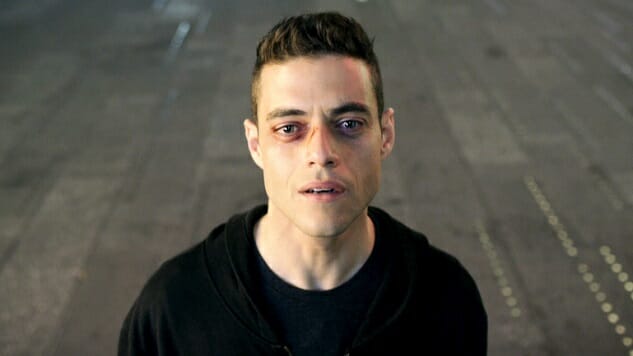Mr. Robot Vs. The Leftovers: The Highs and Lows of Sophomore Seasons
Images via USA
Most of us can agree that Season One of USA’s Mr. Robot was a big deal. Last summer, this was the show that practically everyone felt the need to talk about. There were theories, thematic discussions, and a thrilling feeling that you were part of a conversation that everyone was having. The show was new, it was flashy, and it was exciting.
HBO’s The Leftovers, on the other hand, was a relatively small deal during its first season. After much excitement and buzz, the series seemed to debut with more of a whimper than a bang, and it was hard to find takes that weren’t completely confounded or ambivalent.
In their second seasons, the narratives for these shows flipped. The Leftovers became the show that couldn’t be missed, while Mr. Robot seemed to become little more than a blip. Now, Mr. Robot’ second season hasn’t been a failure, and The Leftovers wasn’t earning gangbuster ratings in its sophomore year. It just seems clear that the buzz has perceivably shifted away from Mr. Robot.
There have been plenty of pieces written about what appears to be happening to the show, and why it can’t seem to thrill audiences the way it once did. Part of the problem is that, no matter what the show does during its sophomore season, it can never reclaim the sense of excitement that accompanied its initial run. Part of that must be attributed to expectations. Mr. Robot’s first season was a surprise smash, and its second season had to live up to that reputation. It was a near-impossible task.
Mr. Robot also faltered in much more problematic ways, though. The twist that occurred around the midpoint of the second season was widely decried as unnecessary and a waste of viewer time. And really, this is at the heart of what makes Mr. Robot’s second season so disheartening. The first season was propulsive. It introduced us to a world where its characters had a clear objective, and were working towards carrying that objective out. And at the end of Season One, Elliot and F Society succeed in taking down E Corp. That’s it. Mission accomplished.
Season Two picks up right there, and is forced to deal with the ashes that Elliot and company created when they burned the world down. There’s no clear direction, and so everything begins to drift. We know these characters, and we know the world that they live in, but the rest is a mystery. What’s the goal? Where are things headed? The audience had no clue, because the show burned through all of these questions in its first season. Thus, the second season was left with a series of open-ended questions that were incredibly difficult to answer. Mr. Robot is proof of what can happen when your first season is filled with hooks.
The Leftovers faced the opposite problem. Its first season was based in a series of inactions, and was often oppressive. The characters were almost all inert, and their goals were a mystery to one another and to audiences. As a result, the show felt lifeless, simply a series of strange occurrences that stressed to the audience how horrifyingly sad the characters were.
With its second season, The Leftovers performed a soft reboot. It relocated to Texas, introduced vibrant new characters, and became a much more watchable show. The easiest thing to forget about The Leftovers’ drastic Season Two change is the ways it shifted its plot. Season One was building to something, but it was unclear what that something was until very late in the game. When we finally understood what the Guilty Remnant were planning to do to Mapleton, it was a sudden surprise because we hadn’t realized they were planning anything at all.
-

-

-

-

-

-

-

-

-

-

-

-

-

-

-

-

-

-

-

-

-

-

-

-

-

-

-

-

-

-

-

-

-

-

-

-

-

-

-

-








































